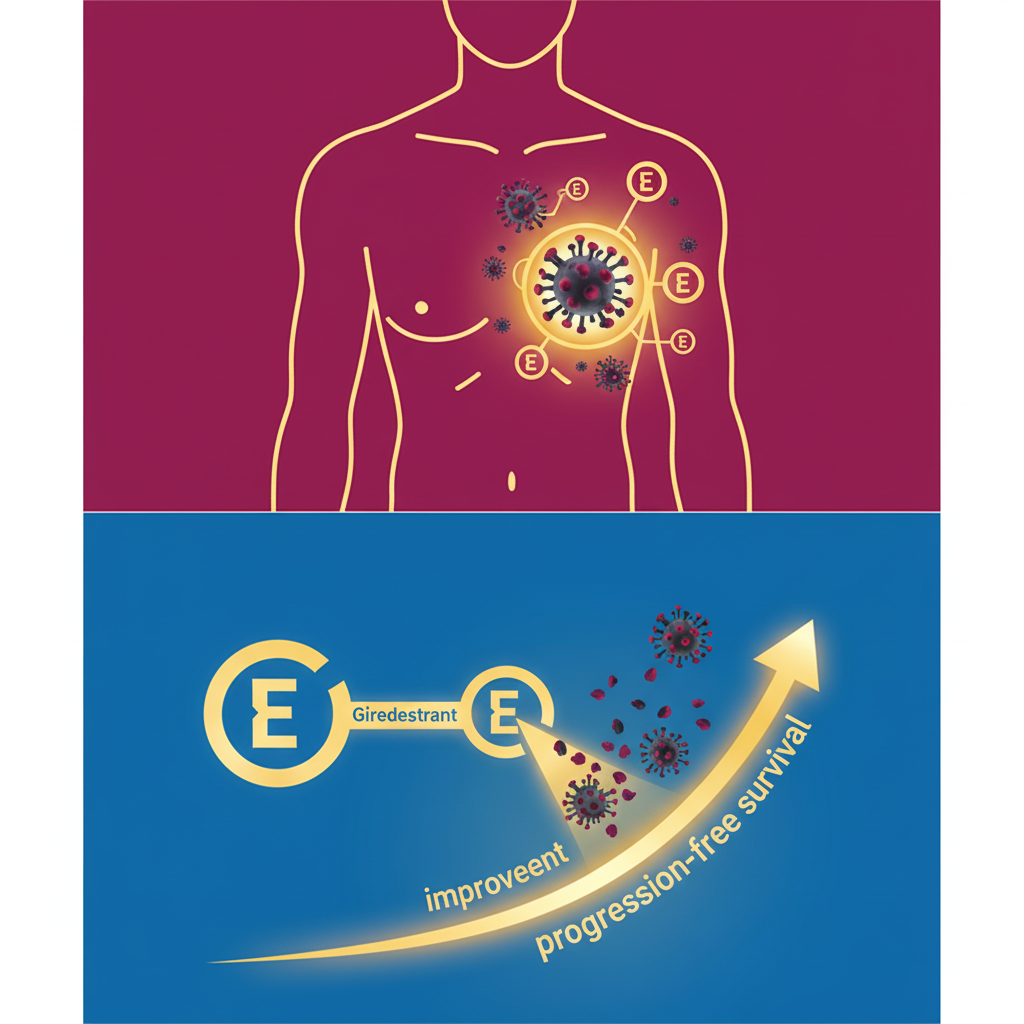Written and Reviewed By: Vikas Londhe, MPharm
Roche/Genentech’s phase 3 evERA trials found that Giredestrant plus everolimus significantly improved progression-free survival (PFS) versus standard-of-care endocrine therapy plus everolimus in patients with estrogen receptor-positive, human epidermal growth factor receptor 2 (HER2) negative, locally advanced or metastatic breast cancer previously treated with a cyclin-dependent kinase (CDK) 4/6 inhibitor. The study met both co-primary endpoints (Intention-to-treat and ESR1-mutant populations). Roche says data will be presented at an upcoming medical conference and submitted to regulators.
The evERA Phase 3 trial
evERA (NCT05306340) is a global, randomized, open-label, multicenter phase 3 trial sponsored by Roche/Genentech. It was specifically designed to evaluate whether giredestrant, an oral selective estrogen receptor degrader (SERD), could improve outcomes when combined with everolimus, compared to the current endocrine therapy standard of care plus everolimus. Patients were randomized in a 1:1 ratio. Researcher also included presence of ESR1 mutation, prior lines of endocrine therapy, and geographic region. This helps balance groups and allows valid subgroup analyses.
The evERA trial enrolled patients with estrogen receptor (ER)-positive, HER2-negative locally advanced or metastatic breast cancer who had experienced disease progression after prior treatment with a CDK4/6 inhibitor plus endocrine therapy in the advanced or metastatic setting. Eligible participants could have either measurable or non-measurable disease, but all needed to be suitable candidates for further endocrine therapy in combination with everolimus. The study population included both ESR1-mutated and wild-type tumors, though it was deliberately enriched for patients with ESR1 mutations, as this group represents a particularly difficult clinical challenge. Overall, the trial population reflects a real-world treatment gap where therapeutic options remain limited once resistance develops following CDK4/6 inhibitor therapy.
Results of the Trial
Roche announced that the evERA trial met both of its co-primary endpoints, demonstrating a statistically significant and clinically meaningful improvement in progression-free survival (PFS) with giredestrant plus everolimus compared to standard endocrine therapy plus everolimus in both the overall intention-to-treat population and in patients with ESR1-mutated tumors. At the time of reporting, overall survival data were still immature, although a positive trend was observed with follow-up ongoing toward the next analysis. The combination was generally well tolerated, with adverse events consistent with the known safety profiles of giredestrant and everolimus, and no new safety concerns emerged. Roche stated that the full dataset will be presented at an upcoming medical meeting and submitted to health authorities. While the press release confirmed statistical significance, specific details such as median PFS values, hazard ratios, confidence intervals, and p-values were not disclosed and will become available once the data are formally presented and published.
Interpretation
The evERA trial offers several important insights. Clinically, it represents a notable advance as one of the first positive phase 3 head-to-head studies of an all-oral SERD regimen in the post-CDK4/6 inhibitor setting, where treatment choices are limited to fulvestrant or mTOR pathway agents. By combining giredestrant with everolimus, the regimen simultaneously targets estrogen receptor signaling and the mTOR pathway. The enrichment of the study population for ESR1-mutant tumors is particularly meaningful, as these mutations are a common driver of resistance to aromatase inhibitors and often limit the effectiveness of existing endocrine therapies. Showing clear benefit in this group strengthens the case for giredestrant as a targeted approach. From a safety perspective, Roche reported that adverse events were consistent with the known profiles of giredestrant and everolimus, with no new safety concerns identified. Tolerability and discontinuation rates will be important to assess once the full dataset is available. Finally, Roche intends to share the findings with health authorities and follow regulatory submissions.
About Giredestrant
Giredestrant is an oral selective estrogen receptor degrader (SERD) being developed by Roche/Genentech. Unlike traditional endocrine therapies that block or lower estrogen, SERDs bind directly to the estrogen receptor, change its shape, and trigger its degradation, effectively shutting down estrogen signaling in cancer cells. Giredestrant is designed to be highly potent, active against tumors with ESR1 mutations, and easier to administer than fulvestrant, which requires intramuscular injection. Its oral formulation also makes it suitable for long-term use and for combination with other targeted agents, such as everolimus or CDK4/6 inhibitors. Early-phase studies showed encouraging anti-tumor activity and a favorable safety profile, leading to the phase 3 evERA trial now reporting positive topline results.
About estrogen receptor (ER)-positive breast cancer
ER-positive, HER2-negative breast cancer is the most common subtype of breast cancer, accounting for about 70 percent of all cases. These tumors depend on estrogen signaling to grow and spread, which is why endocrine therapy has long been the backbone of treatment. Over the last decade, the addition of CDK4/6 inhibitors to endocrine therapy has transformed care, significantly extending survival in the metastatic setting. However, most patients eventually develop resistance, often driven by mutations in the ESR1 gene, which make the receptor active even without estrogen. After disease progression on CDK4/6 inhibitors, treatment options are limited, and many patients eventually need chemotherapy. New endocrine strategies, such as oral SERDs like giredestrant, are being developed to overcome resistance and extend the effectiveness of hormone-based treatment.
Key Opinions
Dr. Levi Garraway, Roche’s Chief Medical Officer and Head of Global Product Development, said: “These results show that the Giredestrant combination provided a meaningful benefit for ER-positive breast cancer patients whose disease has progressed following treatment with a CDK inhibitor.” “We look forward to discussing these results with regulatory authorities with the goal of making this giredestrant-based regimen available to many people with advanced ER-positive breast cancer.”
References
ClinicalTrials.gov. A Study Evaluating the Efficacy and Safety of Giredestrant Plus Everolimus Compared With the Physician’s Choice of Endocrine Therapy Plus Everolimus in Participants With Estrogen Receptor-Positive, HER2-Negative, Locally Advanced or Metastatic Breast Cancer (evERA Breast Cancer) [Internet; cited 2025 September]. Available from: https://clinicaltrials.gov/study/NCT05306340.
Positive phase III results show Roche’s giredestrant significantly improved progression-free survival in ER-positive advanced breast cancer, Roche, 22 Sept 2025, https://www.roche.com/media/releases/med-cor-2025-09-22#:~:text=Positive%20phase%20III%20results%20show,ER%2Dpositive%20advanced%20breast%20cancer

